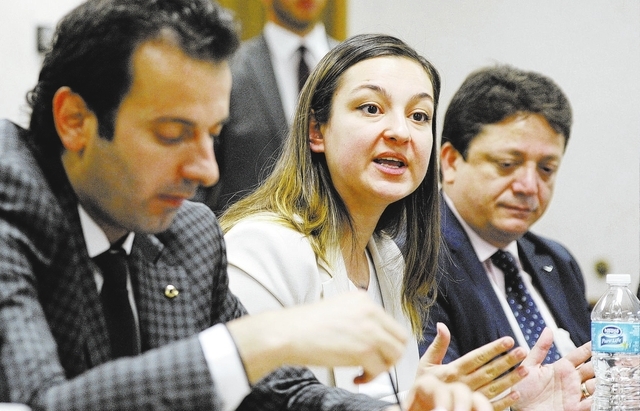Judicial elections bemuse visitors
The Turkish judicial contingent was a respectful group, but try as they might members of the delegation couldn’t remove the looks of surprise from their faces.
At the offices of the Review-Journal on Friday as part of their participation in the Open World Leadership Center’s Rule of Law Program, the judges and prosecutor represented a cross-section of Turkey’s legal system. The Open World program locally is hosted by Senior U.S. District Judge Lloyd D. George.
Their questions to reporters were astute, and their own answers seemed about as candid as members of the judiciary anywhere get with journalists.
But what they really wanted to ask about were the signs.
You know, those signs they’ve been seeing along our streets and roadways that advertise Southern Nevada’s plethora of judicial races.
Through a translator, the prosecutor from a distant land politely noted the painfully obvious. Namely, that electing judges and contributing to their campaigns create potential conflicts and the perception of bias. He found “the fact that judges are elected very interesting,” which might be the nicest thing ever said about Nevada’s annual judicial sweepstakes.
In Turkey, which is no one’s idea of an open society these days, judges must pass a series of tests before taking the bench. They serve in a system of seniority and, at least in theory, can be removed for cause by the same high court that originally approved them.
In reality — and here’s the rub that crosses all borders — not many judges are removed from office. Perhaps only 10 in the past decade out of many thousands, a member of the Turkish contingent said.
That might mean that the justice system in Turkey is just plain superior to our own, which allows the votes of citizens both informed and ignorant to count the same and also gives judges the right to raise piles of campaign cash from the very lawyers who will stand before them. But I don’t think so.
To put it less politely than the gentleman from Turkey, our system does create a helluva perception of conflict — especially when highly successful attorneys such as Robert Eglet are willing to spend a bundle and hire their own judicial race handicappers.
Our way allows the best and brightest to succeed, but only if they’re willing to fundraise. It also occasionally enables the mediocre to prevail. During the rapid expansion of the court system here, it opened the door to some lamp posts with law degrees to take the bench and sit in judgment of others.
Most judges learn on the job and emerge competent and professional. Others never get it right, and it can take years to get rid of them.
But the system of judicial appointment, sometimes called the Missouri Plan, also produces mixed results. It’s also slow to remove the incompetent and even the shifty. Whether appointed or elected, a judge with sticky fingers always will find ways to fill his palm and have someone else pick up the tab for his exotic vacation.
Although the Review-Journal attempts to interview every judicial candidate, the public pays little attention to courthouse campaigns. The process favors the photogenic and the familiar. Those signs on the roadside are there for a reason, my Turkish friends.
Name recognition and fundraising skill are two of several reasons it was so hard to yank rancid Family Court Judge Steven Jones from office. Despite years of controversy and suspected corruption, Jones still received high marks in the Review-Journal’s annual judicial survey. It took a federal indictment to pry him from the bench.
Because most Nevada voters appear unwilling to change the system that exists, the best way to improve the breed is to increase the transparency of campaign finance laws, strengthen whistleblower protection, ramp up press scrutiny and add some teeth to the state Judicial Discipline Commission.
Not that courthouse observers are anticipating such changes any time soon.
Our method of electing judges is imperfect and perhaps even out of date, but the process is still in the hands of the citizens who sit as jurors of their peers and might one day stand before the bar of justice themselves.
It’s not ideal, but it’s the system we have. It works most of the time, thankfully, and it affords the possibility of correcting its mistakes.
Even if it is hard to explain to strangers.
John L. Smith’s column appears Sunday, Tuesday, Wednesday, Thursday and Friday. Email him at Smith@reviewjournal.com or call 702-383-0295. Follow him on Twitter @jlnevadasmith.




























